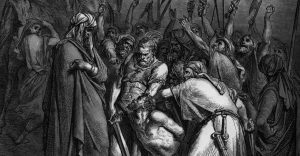One of my favourite Mel Gibson’s films is “Conspiracy Theory” (CT). I like it, not because I’m enamoured by such theories but because, as with any good film, you’re left wondering up to the end: Is Gibson’s character paranoid—making connections between news events due to some mental illness—or is there some objective reality behind his theory?
I’m writing this article after an hour and half conversation with an old friend who I have not seen in 30 years. Let me stress he is not mentally unstable. He unfolded the most elaborate and detailed conspiracy theory (CT) that involved, The Illuminati, the Roman Catholic church, Pedophile rings, the Dark Web, CIA organised murders, and the production of genetically modified food to reduce the world’s population. After 90 minutes I was exhausted.
No matter what questions I raised to gently challenge the theory, they were all explained away. There was no admission to any problem with the theory or any loose ends. In fact, when I noted some inconsistencies in the theory, aliens were introduced to iron out the wrinkles.
The first thing I noticed is that no matter what questions I raised to gently challenge the theory, they were all explained away. There was no admission to any problem with the theory or any loose ends. In fact, when I noted some inconsistencies in the theory, aliens were introduced to iron out the wrinkles.
As he outlined his theory I began to wonder: is this how Christianity sounds to people? And, why are people attracted to such conspiracy theories?
Here are five observations on conspiracy theories in light of those questions:
1. CTs attempt to make sense of our world.
CTs aim to join the dots and bring together the mass of information we are all drowning in. Our finite minds are struggling to manage an onslaught of data that can’t be processed. CT is one attempt to bring order out of chaos.
Christianity also does just that—and better. It is a coherent world view that explains both the small details of life and the big trends without over-claiming and over-promising. It explains all aspects of our existence including; life and death, health and sickness, human nature at its best and worst; both good and bad government; the meaning of history and the meaning of life. It speaks to the past, present and future by pointing to Jesus as Lord, Judge and King ruling in this creation and the next.
2. A jaundiced view of the press and power.
CTs are, in part, an understandable reaction to real manipulations of the news. History and experience often show that the press have often failed us. We’ve gotten used to political “spin”, and now, “fake news”. We’re aware that all the superpowers—USA, China and Russia—actively meddle with each other through spreading disinformation.
So, those who are suspicious of government have reason to be so: governments are made up of humans who are both image bearers, doing good, but also fallen and sinful. They can be (and often are) used by Satan to exploit the powerless and oppress believers (Daniel 2, 7, Rev 13).
And yet, the Bible says we should still be thankful for government. Even bad rulers are servants of God given by him to restrain wickedness, and punish evil doers. (Roman13). CT proponents are never thankful for imperfect governments. We should be aware that even a bad government is better than no government at all. Anarchy is still the worst of all worlds.
3. A suspicion that things are not what they seem.
CT lovers are always trying to peer behind the curtain. They point to anonymous men in closed meetings who operate in the shadows and who are pulling strings to gain control and thus make life for the average person hard to live.
Christianity says this perspective is half-right. There really is a reality beyond what we can see: “we do not wrestle against flesh and blood, but against the rulers, against the authorities, against the cosmic powers over this present darkness, against the spiritual forces of evil in the heavenly places.” (Eph 6:12). Satan is the prince of this world, and he has blinded the minds of unbelievers. As we have noted governments are both agents of our Lord to restrain evil and are also used by Satan to promote harm and oppress people.
4. We are all part of the problem (not just “them”).
The situation is worse than these theories think it is. Because the problem is not just out there but within. While CTs focus on small groups of powerful villains, the Bible says we are all involved. We are all trying to “suppress the truth,” (Rom 1:18); all trying to help each other forget that we have a Creator and a Judge who is going to hold us accountable.
The situation is worse than these theories think it is. Because the problem is not just out there but within. While CTs focus on small groups of powerful villains, the Bible says we are all involved.
When the Times, asked its readers, “What’s wrong with the world?” Chesterton’s simple answer was, “I am!” Those who hold to CT don’t think deeply enough about their own part in the world problems.
5. CTs as Gnosticism
CTs love the idea of “secret knowledge”—so did a movement known as Gnosticism in the early church. Gnosticism promised privileged inside knowledge for a spiritual elite. To gain insight you needed to access those with special knowledge to access the truth.
And that’s what CT advocates think too. As my friend was speaking, he was setting himself up as the man “in the know”—the one who could solve the puzzle and join the dots.
But the Christian worldview says that God’s revelation took place in history in the open; not, as Paul said, “… in a corner” (Acts 16:26). It is based on eye witness evidence and written down for public scrutiny (John 20:30-31). The preacher’s task is simply to set forth the word of God plainly and clearly without underhanded methods.
Conclusion
CT promotes fear without a meaningful solution. In contrast Christianity promotes confidence in Christ for both the present and the future—even in the worst of tyrannies. Because Jesus is alive and ruling, God’s people can have an inexpressible joy and assurance (1Peter1:3,6,8).
We fear the Lord so that we can serve the Lord without fear. Through him we know that we can have peace with God, victory over death, complete forgiveness and transformed lives. We look forward to a day when Satan will be disarmed and thrown down; We look forward to a new heaven and new earth.
We have a better story for Christians worship a sovereign and gracious God which means, “If God is for us, who can be against us?”















